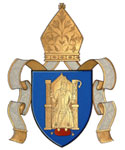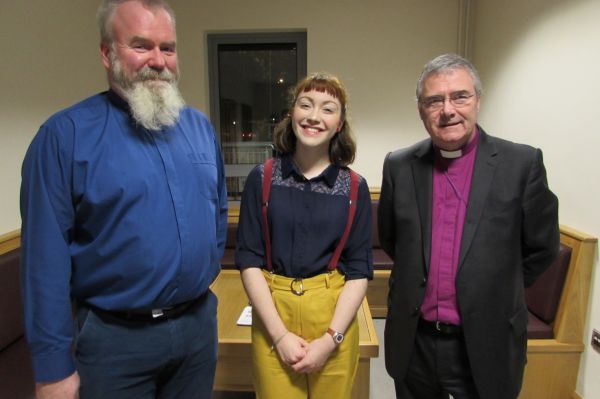 |
 |
News
Diocese hosts disability awareness training event

Taking part in the Disability Awareness Training.
A very informative and inspirational training session on Disability Awareness was hosted by Clogher Diocesan Board of Social Theology in Action on 30th October in the Cathedral Hall, Enniskillen.
The event gave an overview of disabilities in society and focussed on relevant issues.
The training session was introduced by the Board’s Chairman, Revd Charles Eames and delivered by Katherine-Alice Grasham, Disability Officer and Children, Young People and Families Adviser with the Anglican Diocese of Leeds.
She firstly introduced herself and described her own disablement as she suffers from ADHD, Chronic pain, Depression/Anxiety, Asthma, Chronic migraines and Coeliac Disease.
Setting the scene, she posed the question, “What is a disability?”
She described this by The Equality Act 2010 ‘as a physical or mental impairment which has a substantial and long-term adverse effect on a person’s ability to carry out normal day-to-day activities.’
She then highlighted a number of conditions and asked those present to select what they thought were disabilities such as spinal injury, hearing loss, autism, chronic pain disorders, dementia, depression, sight loss, fibromyalgia, asthma, dyspraxia, anxiety disorders and ADHD.
Katherine-Alice noted that The Equality Act (UK) stated that organisations must make ‘reasonable adjustments’ for people with disabilities and that churches for example had an ‘anticipatory duty’ to think ahead and try and accommodate for all abilities ahead of any arising issues.
She said Employment Equality Act (Ireland) stated that a person who had a disability should not be regarded as other than fully competent to undertake and fully capable of undertaking any duties if, with the assistance of special treatment or facilities, such a person would be fully competent to undertake, and should be fully capable of undertaking, those duties. The Act states that an employer should do all that was reasonable to accommodate the needs of a person who has a disability by providing special treatment or facilities.
Statistically, there are around 13.9 million people in the UK who are disabled, eight per cent of them children and 45 per cent of them of pension age. In Ireland it is estimated there are around 400,000 disabled people three per cent of them children and 30 per cent of them of pension age.
Katherine-Alice said the most common impairments were mobility (57%), stamina/breathing/fatigue (38%), dexterity (28%) and mental health (16%).
She explained how being disabled was tough, as they were more than twice as likely to be unemployed as non-disabled people and living costs £570 more on average each month if disabled.
Everyone is affected, adults, children, carers and families.
She highlighted how a social model of disability was more acceptable. This model says that people are ‘disabled by barriers in society,’ not by their impairment or difference. These barriers can be physical, such as buildings not having accessible toilets or caused by ‘people’s attitudes’ to difference such as assuming disable people can’t do certain things.
She stressed how language was important.
“It is considered much better to say things like ‘people with disabilities’ than ‘the disabled.’ Some phrases were not helpful, such as ‘differently abled.’
Regarding disability and theology, Katherine-Alice outlined how there were biblical references to healing, etc.
Katherine-Alice highlighted a slide in her Powerpoint presentation which read; “A church that excludes people because they are disabled is itself disabled.”
She then examined physical accessibility and quoted from the National Access Audit on access, inclusion and welcomed anyone with disabilities, mental health problems and autism spectrum; “Help you to ensure that your church buildings, worship, activities and people are as welcoming and inclusive as you would wish to all in your local community.” She provided a template to assist with making churches “A place to belong.”
Katherine-Alice also explained how invisible disabilities were present too explaining; “An invisible disability is a disability that cannot be seen, and may not require a wheelchair, crutches or a blue badge.”
Physical disabilities would include Lupus, M.E., Chronic Fatigue Syndrome, Fibromyalgia, Chronic Pain Disorders while mental illnesses would include depression, stress, anxiety, schizophrenia and Bipolar Disorder.
Learning difficulties and neuro-divergencies would include autism, Asperger’s Syndrome, ADHD, Dyspraxia, Dyslexia and Tourette’s Syndrome. Other conditions were asthma, diabetes, epilepsy, migraines and allergies.
She then posed the question; “How can we support people with disabilities that we can’t see?” She suggested having a culture of acceptance, be willing to change and think ahead.
Turning to children with additional needs, Katherine-Alice said that 15% of school-age children had additional needs and children with special educational needs (SEN) were twice as likely as other children to be bullied regularly and they may struggle with education, money and friendship. Adults can help children with these needs by being aware, be patient, be advocates and speak to parents.
Katherine-Alice referred to an article in Youth and Children’s Work magazine written by British comedian, Sally Phillips who has a son with Down’s Syndrome where she identified ways to improve communication.
Katherine-Alice also shared information on inclusive worship by adopting spiritual pathways. She identified ways of adapting worship to people with different needs.
Her talk was delivered in an easy to understand and engaging way.